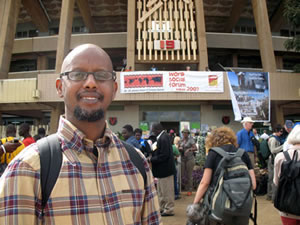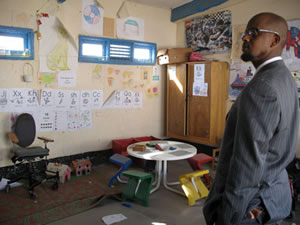oregonminoritybusiness.com
Wednesday, March 28, 2007
Born into a nomad family in Somalia, Kayse Jama, founder and director of the Center for Intercultural Organizing, has lived through three life cycles. For the first nine years of his life, he thrived in a nomadic existence with his family in rural Somalia, then later emerged as a youth leader in Mogadishu. More recently, he has gained community recognition as an accomplished civic organizer and staunch advocate for immigrant and refugee rights.
His work alongside volunteers and other staff members at the Center for Intercultural Organizing has resulted in successes on many fronts, in raising awareness about issues affecting refugees and immigrants living in Portland. In 2006, the City of Portland passed a resolution protecting the rights and liberties of immigrants and refugees. The group’s significant contributions to advocacy work, combined with their commitment to community building and education, led to the creation of the city’s first-ever Immigrant and Refugee Task Force in 2007.
 |
| Kayse Jama attended the 2007 World Social Forum held in Nairobi, Kenya in January |
Kayse has been selected by Mayor Tom Potter's office to serve on the task force. The center also facilitated collaboration among immigrant and refugee-led community organizations and individuals who came together to work on a wide-scale study designed to spotlight immigrant and refugee issues and solutions. Organizers collected 1,000 surveys from African, Latino, Arab, Slavic, and Asian/Pacific Islander communities. In December 2006, results were published in the report "Uniting Cultures in Portland: Bridging the Gaps in City Policy."
Kayse, who also serves as an adjunct instructor at Portland State University, did not have access to formal education until age 9. “My family lived a nomadic life – we had camels, goats and sheep. We followed water on the grass. When I was 9, my brother who was working with the minister of Education in Somalia in Mogadishu, drove a pickup truck for three days, to pick me and my other brother up. He took us to the big city so we can go to school.”
Life in the big city was very different and quite confusing for a young boy who has always lived in small, close-knit communities. “It was a huge adjustment, because I had to learn all the skills to survive in the city. When sitting in my class, my goal was to fit in and be accepted. Early on, I realized that even if you’re speaking the same language and culture, it’s hard to be accepted if you’re the least bit different,” he said.
Eventually, as Kayse became more accustomed to his new life, he began to realize that success lies in being true to his roots. “You just need to be who you are, to be accepted as you are. You cannot try to wear someone else’s shoes,” he said.
 |
| Kayse visits an elementary classroom during his trip to the World Social Forum |
Kayse’s intellectual and leadership gifts became apparent to his teachers, who called upon him for help in teaching literature. “I come from a nomadic culture, where poetry is part of our daily life. I was at the head of the class, and the teacher and other students knew that I knew poetry because of my background,” he explained.
“Somali teachers didn’t get paid very well, so they did the least that they can. They asked if I wouldn’t mind teaching literature to my classmates: there were 60 students in our class. When she saw how well I was doing, she asked if I would also teach the other three classes.” Kayse didn’t get paid for teaching the classes. “For me it was just exciting – being a young boy teaching the other students,” he said.
In Mogadishu during the 1990s, Kayse became one of about a dozen exemplary students who served on a citywide student body organization that advocating on behalf of students in public schools.
“The country was on the brink of collapse. Each year, the education system was getting worse and worse, because the government was spending a lot of money on fighting. There were rebels that were fighting the government, so the government was spending more and more on the war, and less and less on education,” he explains.
Kayse was in 11 th grade when he organized student body leaders to demand an audience with the Minister of Education. “We were living under a dictatorship, but we were young and naïve. We believed we could make a difference. In Somali society, challenging authority is not something young people are expected to do. Still, we met with the Ministry of Education, demanding that they address the needs of students. He made some promises, none of which ever materialized. That was a hard lesson in Advocacy 101.”
The civil war in Somalia exploded the following year, and soon the entire country was engulfed in war. “There were lots of refugees coming to Mogadishu. Attendance in school was dropping,” he said. To motivate students from his school to continue coming to class, Kayse relied on what he knew best: literature. He started writing short stories about life as a Somali youth that were then read by students in front of their peers.
“Every morning, as the students lined up to hear morning announcements, we spent a portion of the time to read the stories,” he said. In telenovela or soap opera fashion, Kayse would cut the story short as the plot continues to thicken.
“The stories were about the students’ struggles, about their lives during those difficult times. They could relate to the stories and were eager to hear about what would happen next,” he said. After a month of storytelling, the school reached a 100% attendance rate. No amount of storytelling could keep the civil war at bay. Kayse escaped the country in the early 1990s, in his search to seek refuge in different parts of the world. He ended up in Portland in 1999, after staying for a short while in San Diego.
In his newly adopted city, Kayse immediately started working and going to school. He rediscovered his calling for advocacy work when he took on a job at a local social service agency that served the needs of refugees. He served the role of African Youth Coordinator, which involved setting up after-school programs in different public schools
“That was the first time since becoming a refugee myself that my work has come full circle,” he said.
Early experience served as a rude awakening in power plays involved even in grassroots advocacy work. “On my third day on the job, I began working on my first case, advocating for a refugee student who was expelled from school. When he and I went to his school to talk to administrators, I could never forget how unfriendly the reception was. They were extremely rude to us; the hostility was not even hidden,” he said.
When he reported the incident to his supervisor, she talked to school officials to demand an explanation. Kayse went back to the school the next day, and was surprised that “the dynamics totally changed. They were so apologetic, and took care of everything. I realized that the change wasn’t about me, and it wasn’t about being just and fair. The change came about because of the authority of the agency behind me,” he said.
Kayse continued his work at the agency, creating after-school programs for refugee students attending Portland Public Schools. “It really taught me a lot about what youth of color are going through in the school system in this city,” he said. “I learned a lot about the dynamics of social services.”
Working with youth also allowed Kayse an opportunity to learn about the issues facing Somali and African refugee and immigrant women. Eventually, Kayse wanted to focus his work beyond providing social services to immigrants and refugees. “I realized that the work shouldn’t simply be about services. The real work is impacting how people are treated in this city, in this state.”
When the 9/11 terror attacks happened, Kayse decided to leave the agency to devote his energies elsewhere. Key incidents led to a new chapter in Kayse’s advocacy and organizing work, such as his exposure to the inner circles of the Somali Women’s Association, learning about the discrimination and harassment suffered by Muslim African immigrant women in Portland streets. Community women shared stories of being thrown garbage at bus stops, spit on, and being called names such as “Osama” while walking along Portland streets.
“I experienced racism in Portland, but not in terms of being a Muslim person. Unless I tell people I’m a Muslim, it’s not easy for people to identify my religion,” he said. “Because they adhere to traditional Muslim dress code, our women are the visible symbols of our religion.”
Kayse sought to learn more about how best to educate various communities of Portland about refugee life, so he started participating in the local peace movement. “Most of the time, I’m the only person of color, and the only immigrant in the meetings. I ended up feeling that it wasn’t a welcoming environment. Working with activist of color, I realized that Portland is a very segregated city, even in the peace movement.”
“I felt that we needed to find a place where immigrants and refugees can gather and set agenda. We need to have our political space, and wntil we do that, we are voiceless,” he said.
The Center for Intercultural Organizing got its start as the Community Language and Culture Bank. During the organization’s first 18 months, the goal was to create a dialogue among different communities. “At first, all we did was dialogue and discussion through monthly public forums. We chose different subjects and invited guest speakers who led community discussions. The forums allowed people to discuss a very broad array of issues – mostly issues that affect people of color in this city,” he said.
An average of 60 to 80 people converged at each forum, which also served as a survey of community issues and concerns. Learnings from the forum allowed the center to focus their efforts on four key areas: education, civic engagement, community mobilization and leadership development.
The center’s education efforts target Portland residents through Refugee and Immigrant Solidarity Education (RISE) workshops. The popular education model exposes participants to the dynamics of immigration, political influences on immigration policy, and effective community organizing tactics.
Leadership development offers skills and tools for up-and-coming leaders of immigrant and refugee communities. “Until you have skilled, organized, informed, politically educated leaders, it’s hard to make change. Particularly immigrant and refugee communities – we are new to this country. We need to learn the political system and how this country operates. We need to learn how to create activism, engage the system, empower and advocate for our communities.”
The center’s effectiveness at fostering change and providing opportunities for community building and civic engagement has resulted in invigorated advocacy efforts for the rights of immigrants and refugees. Kayse acknowledges that while much has been accomplished in recent years, the center’s work has only just begun.
“We want to keep our organizing skills in line with methodologies from our own cultures, but we also need to learn new skills and dynamic in order to be effective leaders,” said Kayse. “Our goal in leadership development is to hone the analytical skills of leaders, give them skills and organizing tools they need, then support them through the process. Our strategy is to enable people to empower themselves.”
Source: Oregon Minority Business, Mar 28, 2007